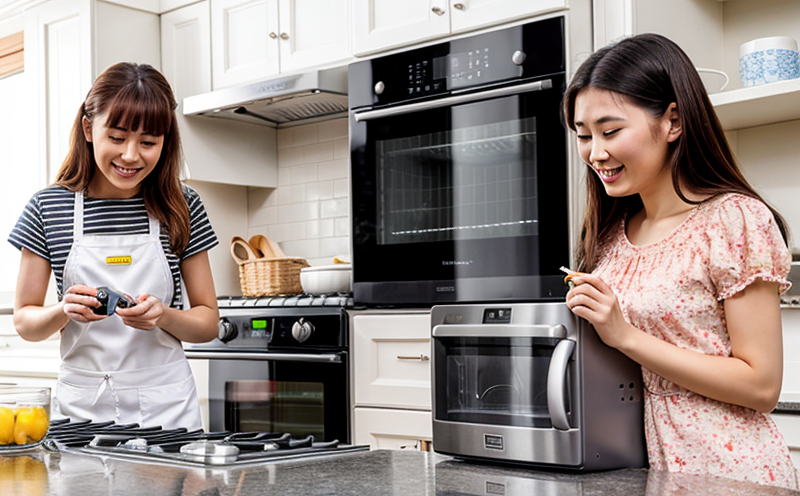UL 746C Polymer Material Performance Testing for Appliances
The UL 746C standard is a critical component in ensuring that household electrical appliances are safe and reliable. This test evaluates the performance characteristics of polymer materials used in these devices, focusing on their resistance to heat, flame, and mechanical stress. Understanding the nuances of this testing can help quality managers, compliance officers, R&D engineers, and procurement professionals make informed decisions about material selection and product safety.
UL 746C is a widely recognized standard that has been in use for decades. It specifies requirements for the flammability, heat resistance, and mechanical strength of polymer materials used in household appliances such as toasters, blenders, and other small devices. The test aims to prevent fires caused by overheating or electrical shorts, which can be catastrophic consequences.
The process involves subjecting specimens to a series of controlled tests designed to simulate real-world conditions. This includes exposure to high temperatures, flame impingement, and mechanical stress. The test results provide valuable insights into the material's performance under these conditions, enabling manufacturers to choose materials that meet safety standards while maintaining product integrity.
For quality managers, this test is crucial for ensuring consistency in material selection across production batches. Compliance officers can use the results to verify adherence to regulatory requirements and industry best practices. R&D engineers benefit from understanding how different polymers behave under stress, allowing them to innovate without compromising safety. Procurement professionals gain confidence that they are sourcing materials that meet rigorous standards.
UL 746C testing is particularly important in the context of household electrical appliances because these products interact directly with consumers and can pose significant risks if not designed and manufactured correctly. The test results help ensure that any potential hazards are minimized, protecting users and their property.
The standard covers various polymer materials commonly used in appliance manufacturing, including polypropylene (PP), polystyrene (PS), and acrylonitrile butadiene styrene (ABS). Each material has unique properties that make it suitable for specific applications within appliances. By testing these materials according to UL 746C guidelines, manufacturers can ensure they are selecting the most appropriate options.
The test procedures involve several key steps. Specimens are prepared from the polymer of interest and subjected to a series of thermal and mechanical tests. The specimens are exposed to temperatures up to 300°C for extended periods to assess their heat resistance. Flame impingement is another critical test, where the specimen is exposed to flames under controlled conditions to evaluate its flammability characteristics.
Mechanical stress testing further evaluates how well the material withstands pressure and other forms of physical strain. These tests provide comprehensive data on the material's durability, helping manufacturers make informed choices about their design specifications. The results of these evaluations are then documented in a detailed report, which serves as evidence that the materials meet UL 746C requirements.
The importance of this test cannot be overstated. By adhering to UL 746C standards, manufacturers can ensure they are producing safe and reliable household electrical appliances. This not only protects end-users from potential harm but also enhances brand reputation and customer trust. Compliance with these standards is essential for maintaining regulatory compliance and avoiding costly recalls or product modifications.
Understanding the context of UL 746C testing in the broader framework of electronics manufacturing underscores its significance. Household appliances are a significant part of daily life, and any failure could lead to severe consequences. By leveraging this test, manufacturers can ensure their products meet the highest safety standards, thereby protecting consumers and maintaining market credibility.
Why It Matters
The UL 746C standard for polymer material performance testing is essential in the electronics sector because it directly impacts product safety. Ensuring that household electrical appliances are constructed from materials that can withstand extreme conditions like high temperatures and mechanical stress is crucial for preventing fires, burns, and other hazards.
- Prevents Fires: One of the primary risks associated with household appliances is fire caused by overheating or electrical shorts. UL 746C testing helps identify materials that can resist such conditions, reducing the likelihood of catastrophic failures.
- Enhances Durability: By evaluating the mechanical strength and heat resistance of polymer materials, this test ensures that appliances are built to last longer, improving user satisfaction and product longevity.
- Avoids Hazards: The standard helps mitigate risks related to electrical components coming into contact with flammable substances or being exposed to excessive heat. This is particularly important given the high volume of small household appliances in use today.
- Regulatory Compliance: Adhering to UL 746C ensures that products meet international safety standards, facilitating easier compliance with local regulations and avoiding potential legal issues.
In summary, the importance of UL 746C testing cannot be overstated. It serves as a critical tool in safeguarding public health and property while also supporting brand reputation and customer trust.
Benefits
- Risk Mitigation: By ensuring materials meet UL 746C standards, manufacturers can minimize the risk of fires and other hazards associated with household electrical appliances.
- Enhanced Durability: Testing helps identify materials that are more durable, leading to longer-lasting products and improved user experience.
- Compliance Assurance: Adhering to this standard ensures compliance with international safety regulations, simplifying the regulatory approval process.
- Customer Confidence: Meeting UL 746C standards enhances brand reputation and builds trust among consumers who value product safety.
- Innovation Support: The test provides valuable data that can guide R&D efforts towards safer and more innovative appliance designs.
- Economic Benefits: By preventing recalls and potential lawsuits, adherence to this standard can save manufacturers significant costs in the long run.
- Sustained Product Quality: Consistent testing ensures that all batches of materials meet the same high standards, maintaining product quality across production lines.
The combination of these benefits underscores the value of UL 746C testing in enhancing product safety and reliability while supporting broader business objectives.





